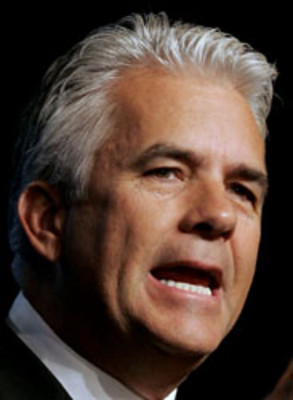Auto dealers explain dilemma to Ensign
Five members of the Nevada Franchised Auto Dealers Association spent half an hour on the phone with Sen. John Ensign on Wednesday, urging the Nevada Republican to reconsider his vocal opposition to $14 billion in loans to the Big Three U.S. carmakers.
"We wanted him to get an idea of what the auto dealers in the state of Nevada are going through, where we're at and what we're at risk for," said Greg Heinrich, a board member and president of the Fairway group of dealerships.
The dealers' basic message: Nevada's 117 car dealers represent the Silver State's second-biggest sales tax generator, so the state will suffer significantly if U.S. automakers fail and take their inventory with them. Combine disappearing manufacturers with stingy credit markets and low consumer confidence, and you have a "perfect storm" that could wipe out 50 percent to 75 percent of Nevada's car dealers, Heinrich said.
Dan Towbin, owner of the five-store Towbin Automotive, also participated in the phone call and seconded Heinrich's comments. Auto sales in Southern Nevada fell 51 percent year-over-year in November, and any additional loss of business "would absolutely just take dealers down."
Fairway, which has 355 employees and four dealerships selling General Motors cars in Las Vegas, Henderson and Pahrump, could last four months to six months beyond any GM failure, Heinrich said.
The dealers also wanted to let Ensign know that his plan to let the automakers go into bankruptcy, with the government guaranteeing warranties for nervous consumers, wouldn't work if the state lost dealerships' service centers.
And because cars are often a consumer's second-biggest purchase after a home, few buyers would gamble on a bankrupt manufacturer, Heinrich added. Look at how Oldsmobile values plummeted after GM said it would discontinue the line, he said. What's more, internal GM numbers show 80 percent of consumers wouldn't buy a car from a bankrupt manufacturer, Heinrich said.
Bankruptcy for the Big Three also could cause borrowing hardships for local dealers, Towbin said. Already, one bank told Towbin it would like additional guarantees if the company continues to sell Big Three products at one of its dealerships.
"Imagine how that conversation would go if that same (Big Three) company they're concerned with now was in bankruptcy," he said. "They would probably ask us to find another lender. But guess what? There is no other lender."
Switching to selling cars for a different manufacturer wouldn't be practical for Big Three dealers either, Towbin said, because automakers' policies and state laws combine to carefully control how many dealers of any given brand populate a market.
Heinrich said Ensign was "gracious" and "polite" during the conference call, and he listened to the board's concerns. But since they talked, Ensign has made several media appearances, and based on the senator's comments, it appears Fairway's plea "had very little effect on his thinking," Heinrich said.
Towbin added that he was frustrated that Ensign seems to have made up his mind.
"I have nothing personally against him, and I think he's done a fine job for the state of Nevada, but I think he's really off-base on this one," Towbin said. "I think it's very risky business. The potential harm to the U.S. economy and the Nevada economy is so great."
Still, Heinrich said he's optimistic a deal will happen. He expects lawmakers sympathetic to the Big Three's plight to pass a plan that would help preserve the 2.95 million U.S. jobs tied to the auto industry.
Late Thursday, however, Republican opposition prevented the Senate from considering the $14 billion emergency bailout passed by the House.
Contact reporter Jennifer Robison at jrobison@reviewjournal.com or 702-380-4512.

















